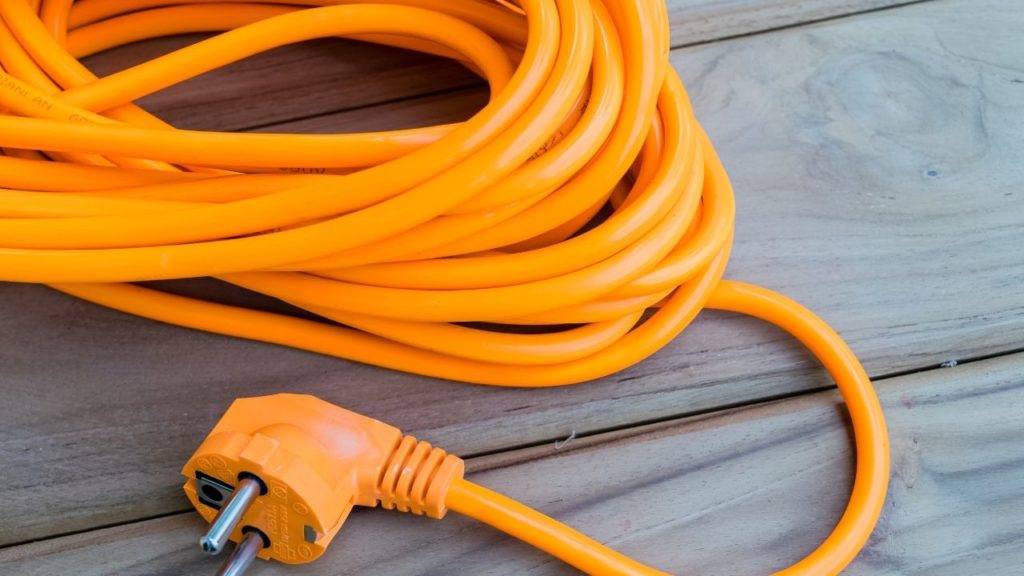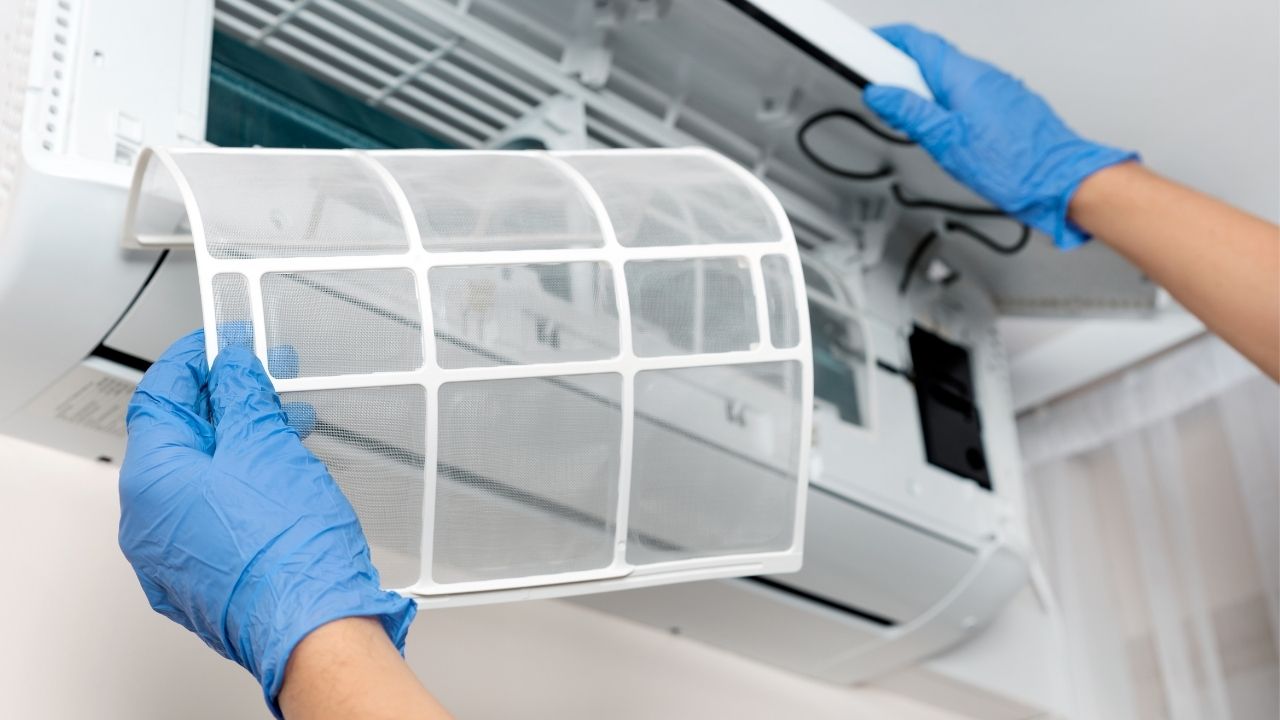If your home is boiling on a summer night and you can’t plug the AC into the wall outlet because the air conditioner’s power cord is too short, the only option is to use an extension cord.
Can You Plug An AC Into An Extension cord?
Air conditioners use too much power. You are more likely to start a fire because the extension cord is transmitting more energy than it was meant to carry, the device will overheat, melting the insulation and igniting the flammable objects in the vicinity.
Is It Safe To Plug An AC Into Extension Cord?
It is not safe to plug an AC into an extension cord. You have two primary concerns, namely:
1). Overheating
Air conditioners are heavy-duty items. They consume too much power. You could start a fire if you plug an AC into a conventional extension cord.
Smaller, lighter, portable ACs are not necessarily safer. Don’t forget: extension cords increase the distance the current has to travel to reach the AC. When you increase the distance, you also increase the resistance, and an increase in resistance elevates the amount of heat the current generates as it travels between the wall outlet and the AC unit.
Therefore, if your extension cord is too long, you can still start a fire, even though your AC is small and lightweight.
2). Voltage Drop
Extension cords can affect the performance of an air conditioner. This is because thinner extension cords have higher resistance, leading to voltage drop.
You don’t want to expose air conditioners (or any appliance with a motor) to low voltage fluctuations because you can cause the motor to stall.
If you don’t have an outlet in the vicinity of your AC, you should ask an electrician to install a few more outlets next to the air conditioner.
Related Post:
- Can You Plug A Space Heater Into An Extension Cord?
- Plugging (Hair, Clothes, Tumble) Dryer Into Extension Cord
- Can You Plug An Extension Cord Into Christmas Lights?
But if you have no choice but to use an extension cord, the following tips can prevent the worst from coming to pass:
Safety Tips To Use Extension Cord
- You should only rely on extension cords in situations where the nearest outlet is just a few feet away. Otherwise, an extension cord long enough to cover the significant distance between an AC unit and the wall outlet is more likely to overheat. Have you looked at the length of the air conditioner’s power cord? There’s a reason why it is so short.
- I want you to pay close attention to the condition of the extension cord. Does it have burn marks, tears, or any signs of wear? If it does, get a new extension cord.
- Don’t hide the extension cord under furniture or carpets. Even if the extension cord is thick enough to meet the air conditioner’s needs, it can still overheat if you run it under objects like rugs that trap heat.
- I want you to place the extension cord in a visible location to prevent people from stepping on or tripping over it, protecting the extension cord from damage.
Are There Extension Cords For Air Conditioners?
People don’t make extension cords specifically for air conditioners. However, many manufacturers make heavy-duty extension cords designed to safely transmit the current that large appliances such as air conditioners use.

You don’t have to search for ‘Air conditioner extension cords’ to find an extension cord that can support your AC. Any heavy-duty extension cord that can run large appliances like freezers can handle the demands of an air conditioner.
What Gauge Extension Cord Is Best For AC?
You need an extension cord of 12 or 14 AWG to support an air conditioner safely. Technically speaking, you can get by with 14AWG wire, especially for an average AC of 1,440 watts.
However, like most appliances with motors, an air conditioner’s energy requirements tend to spike when it cycles on. The air conditioner is more than capable of overwhelming a thick extension cord during that initial stage, which is why it is safer to use 12AWG wire.
How Long Can AC Extension Cord Be?
The maximum length of an AC unit’s power cord is 10 feet (120V) and 6 feet (240V). Because an increase in length leads to a rise in resistance, AC units have thick, short power cords. Your extension cord should match these attributes. Look for the shortest extension cord possible.
Anything longer, and you risk overheating.
When Should You Use AC Extension Cord?
Because extension cords can start fires, you should only use them as a last resort. If you don’t have any wall outlets in the vicinity of your air conditioner, don’t be so quick to use an extension cord. Try the following alternatives:
1). Ask an electrician to install wall outlets near the air conditioner. This isn’t always a viable option, especially for people that want to use the air conditioner immediately. But if you can afford to wait, hire an electrician to install more wall outlets.
2). The wall outlet is not the only culprit in this equation. If the wall outlet is too far for the AC’s power cord to reach, rather than installing new wall outlets next to the AC, it might be easier to get a new power cord.
Any competent technician can replace your unit’s power cord with a longer alternative. However, Hunker doesn’t want you to take this step unless the air conditioner is 10 feet or less from the wall outlet. You don’t want to use a power cord that is too long.
3). Buy a portable AC. Look for models you can move from place to place. As such, if the wall outlet is too far from the air conditioner, you can bring the air conditioner closer to the wall outlet.
You should only turn to extension cords if you can’t use any of these options. If you’ve decided to use an extension cord, make sure the arrangement is temporary.
An extension cord is acceptable if you need to use the air conditioner in an emergency. But once that emergency passes, unplug the air conditioner and experiment with one of the three options listed above.
What Type Of Extension Cord For Air Conditioner?
1). Use The Highest Amperage Extension Cord
I want you to pay close attention to the amperage. The amount of power an AC uses is expressed in watts. Divide the watts by the voltage (120V or 240V) to get the amperage of the air conditioner.
The amperage rating of the extension cord should exceed the amperage rating of the air conditioner.
Air conditioners can use as little as eight amps. But if you have a medium-to-heavy AC, it probably uses 20 or even 30 amps.
If you pair an AC with an extension cord with a lower amperage, the AC will overload the extension cord, starting a fire. The amp rating of the circuit is just as important. Don’t forget: the extension cord connects the AC to the circuit. If the AC’s amperage exceeds the circuit’s rating, you will trip the breaker.
2). Use The Highest Gauge
The gauge determines the volume of electricity the extension cord can safely deliver. Look for an extension cord with the highest gauge (lowest number). 16AWG is light-duty. You can use the wire to operate lights, fans, and other simple loads, but it is too thin for air conditioners.
Aim for 14-10AWG. The best gauge is 12. But if you can afford it, get 10AWG. 10AWG extension cords are extra heavy-duty.
3). Use Short Extension Cord
The best extension cords for an AC are short. Long extension cords are dangerous because they increase resistance. If you want to elevate the length, raise the gauge as well.
4). Use Three Prong Plug
Extension cords with three prongs are grounded. You can trust them to send the excess current to the ground in the event of a malfunction. Look for three-prong extension cords.
For How Many BTU Air Conditioner, Extension Cords Can Be Used?
A 5000BTU ACs can work with 14-gauge extension cords. That number goes up to 12AWG for 6000BTU ACs, 12-10AWG for 8000BTU ACs, 10-12AWG for 10000BTU ACs, 10AWG for 12000 BTU ACs, and 10AWG for 14000BTU ACs.
Can You Plug AC Into Power Strip?
This practice is not recommended. An AC will overwhelm a conventional power strip. You need a heavy-duty power strip whose amperage matches the rating of the AC.
Best Extension Cord For AC
If you don’t want to burn your house down, invest in the best extension cords the market has to offer, including:
1). FIRMERST 1875W Extension Cord
This 6-foot flat plug extension cord has decent specs, including 14/3 gauge, 15A, 125V, 1875W. The product is UL and CUL listed. Soft and flexible, the extension cord can resist temperatures of up to 165 degrees F. The flat plug is perfect for people whose outlets are hidden behind barriers like desks and furniture. It can fit in tight spaces.
2). POWTECH Heavy-Duty Extension Cord
You can find this product in 12 and 3-foot options. The 125V, 1875W, 15A, UL Listed extension cord is sturdy, perfect for heavy appliances like freezers, washers, and dryers. It has an angle plug that connects the extension cord to outlets in tight spaces.
3). Cable Matters 16AWG Extension Cord
This is a 200W 13A 3-prong extension cord with sturdy but flexible construction. People use it to cover long distances between appliances and wall outlets. It has universal compatibility with standard household devices. You can use the extension cord to operate lighter air conditioners.
4). Thonapa 25 Foot Extension Cord
You can get this extension cord in 25- and 10-foot options. The 125v, 15A, 1875W, 10AWG general-purpose product works indoors and outdoors. Consumers use the item to operate household, landscaping, and gardening devices.
The vinyl cover enhances the cord’s resistance to moisture, sunlight, and abrasion. The LED plugs will light up to alert you that the extension cord is connected to a power source.

